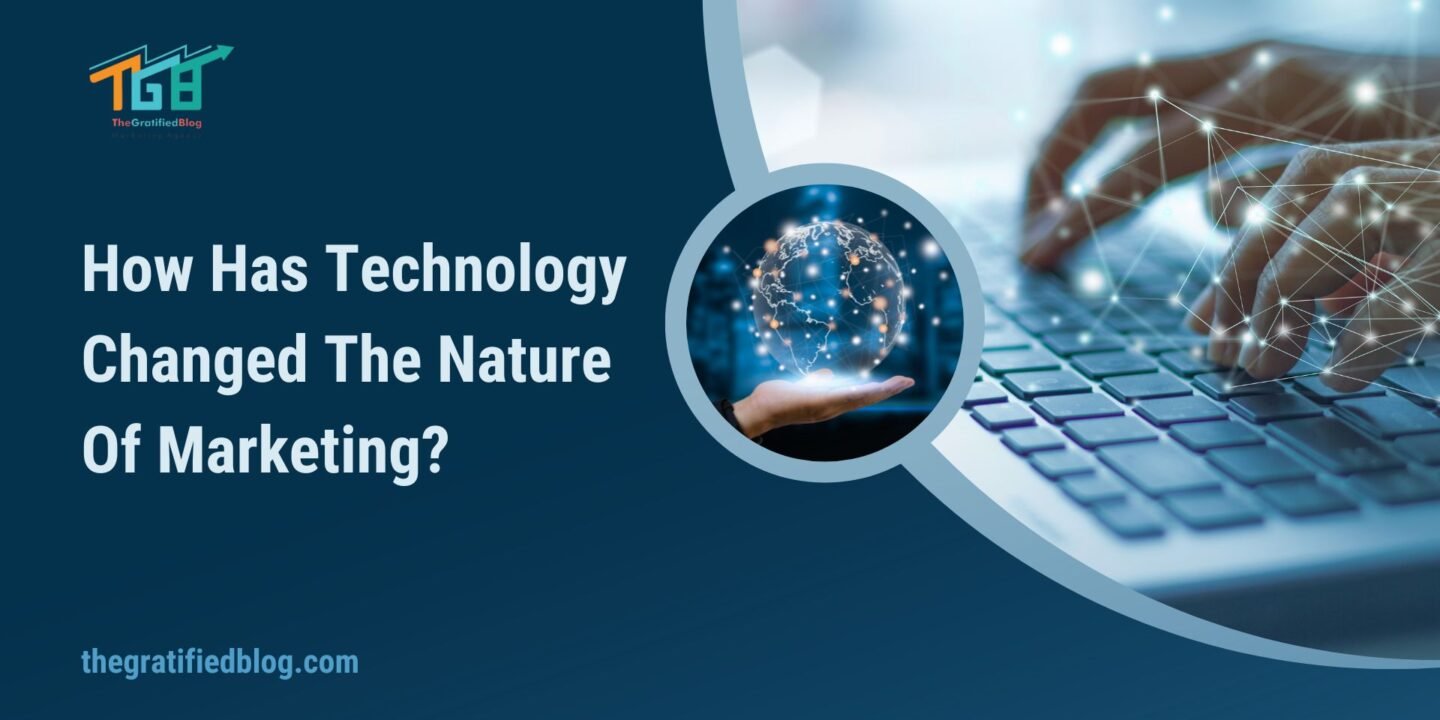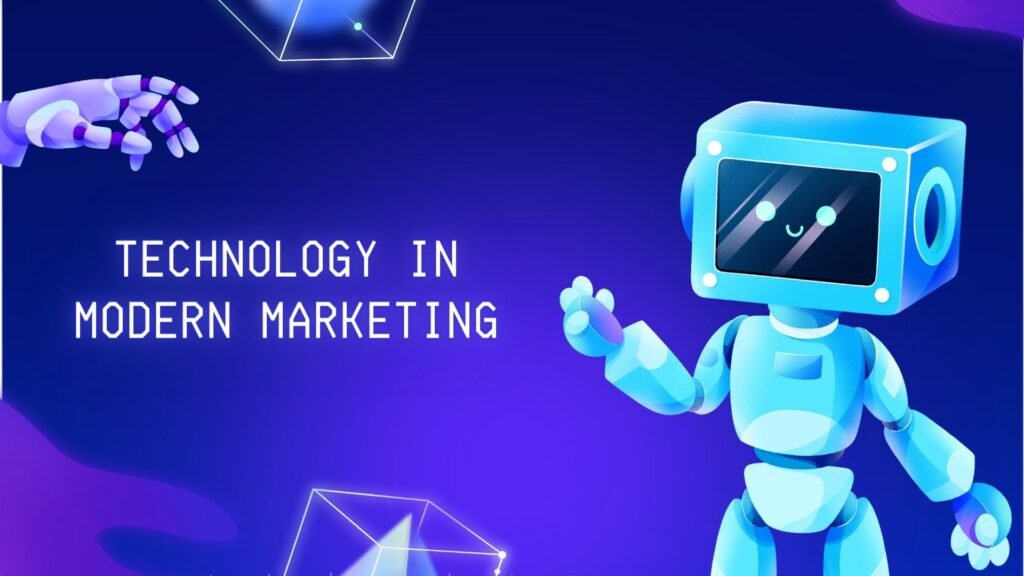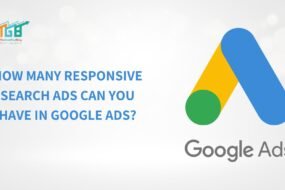
Technology has completely revolutionized the field of marketing in recent years. With the rise of social media, data analytics, and artificial intelligence, marketers now have access to a wealth of information about their target audience and the ability to tailor their messaging more personalized and efficiently. With the evolution of digital marketing, businesses must understand how to leverage these technological advancements to stay competitive in today’s fast-paced market. This blog, “How has technology changed the nature of marketing?” will explore technology’s impact on marketing and provide insights into how businesses can adapt to these changes.
Importance Of Technology In Modern Marketing

Technology plays a vital role in modern marketing by enhancing reach, precision, and engagement. The impact of digital platforms enables targeted advertising, reaching specific demographics with tailored messages and maximizing ROI. Data analytics provide insights into consumer behavior, enabling personalized marketing strategies and real-time adjustments. Automation streamlines processes, freeing resources for creativity and strategy development.
Social media facilitates direct consumer interaction, fostering brand loyalty and amplifying word-of-mouth marketing. Mobile technology ensures constant connectivity, allowing brands to engage with consumers anytime. Technology empowers marketers to adapt swiftly to evolving trends, optimize campaigns, and create impactful brand experiences in the digital age.
How Has Technology Changed The Nature Of Marketing?
How exactly has technology changed the nature of marketing? Let’s delve into some key aspects:
- Data-driven Insights: With the proliferation of digital platforms and tools, marketers can now access unprecedented data about their target audience. From website analytics to social media metrics, this wealth of information allows marketers to gain valuable insights into consumer behavior, preferences, and trends. By leveraging data analytics and advanced algorithms, businesses can refine their marketing strategies, personalize content, and deliver targeted messages that resonate with their audience.
- Personalization and Customization: Technology has empowered marketers to move away from the one-size-fits-all approach and towards highly personalized marketing campaigns. Through behavioral targeting, predictive analytics, and machine learning, companies can tailor their messaging to individual consumers based on their interests, demographics, and past interactions. This level of customization enhances the customer experience and increases the likelihood of conversion and brand loyalty.
- Digital Channels and Social Media: The advent of the internet and social media has democratized marketing, allowing businesses of all sizes to reach global audiences with minimal cost and effort. Platforms like Facebook, Instagram, and Twitter have become indispensable tools for brand promotion, customer engagement, and community building. Moreover, the rise of influencer marketing has enabled brands to tap into the power of social media personalities to endorse their products and services, reaching niche audiences with authenticity and credibility.
- Mobile Revolution: The widespread adoption of smartphones and mobile devices has fundamentally changed how consumers interact with brands. Mobile marketing strategies, such as mobile-optimized websites, apps, and location-based services, enable businesses to connect with consumers on the go and deliver hyper-targeted, contextually relevant messages. Furthermore, augmented reality (AR) and virtual reality (VR) offer immersive brand experiences that blur the lines between the digital and physical worlds.
- E-commerce and Omnichannel Marketing: E-commerce platforms have reshaped the retail landscape, giving consumers unprecedented access to products and services anytime, anywhere. Marketers are now tasked with navigating the complexities of omnichannel marketing, seamlessly integrating online and offline channels to provide a cohesive brand experience across multiple touchpoints. From social commerce to voice search optimization, staying ahead in the digital marketplace requires agility, innovation, and a deep understanding of consumer behavior.
- Voice Search and Smart Assistants: With the increasing popularity of voice-activated devices and smart assistants like Amazon Alexa and Google Assistant, marketers need to optimize their content and strategies for voice search. Technology allows businesses to adapt their marketing efforts to the changing landscape of search behavior and consumer preferences.
- Automation: Marketing automation platforms leverage technology to streamline repetitive tasks such as email marketing, social media posting, and campaign management. This frees up time for marketers to focus on more strategic activities while ensuring consistent and timely communication with customers. Automation has revolutionized marketing strategies by enhancing efficiency and enabling real-time decision-making. Automated tools like chatbots can engage with customers instantly, providing personalized assistance and support. Through automation, businesses can save time and resources while delivering targeted messages to the right audience at the right time.
Artificial Intelligence (AI) And Machine Learning In Marketing
AI-powered tools and algorithms can analyze data, predict consumer behavior, automate decision-making processes, and optimize real-time marketing campaigns. AI and machine learning enable marketers to gain deeper insights, improve targeting accuracy, and enhance the overall effectiveness of their marketing efforts.
Augmented Reality (AR) And Virtual Reality (VR) In Marketing
AR and VR technologies offer immersive and interactive experiences that can be leveraged in marketing campaigns to showcase products, simulate real-life scenarios, and engage customers in new ways. These technologies can help businesses differentiate themselves and create memorable brand experiences.
How Technology Has Revolutionized Marketing Measurement?
Technology has revolutionized the way marketers measure the effectiveness of their campaigns. With the abundance of data available through digital channels, businesses can now track and analyze consumer behavior in real time. Tools such as Google Analytics, social media insights, and CRM systems provide valuable metrics, allowing marketers to assess their strategies’ impact accurately.
The level of detailed data enables companies to make informed decisions, optimize their campaigns, and allocate resources more efficiently. By embracing technology-driven analytics, marketers can gain valuable insights into consumer preferences, behaviors, and trends, ultimately enhancing the overall effectiveness of their marketing efforts.
Adapting To The Ever Changing Marketing Landscape
As technology redefines marketing practices, staying agile in the ever-evolving digital landscape is crucial. Marketers must adapt quickly to emerging trends, consumer preferences, and technological advancements to remain competitive. Embracing new tools, platforms, and strategies is essential for reaching target audiences effectively.
Keeping pace with algorithm changes, consumer behavior shifts, and industry innovations is vital to sustaining success in modern marketing. Marketers can confidently navigate the dynamic marketing landscape by prioritizing continuous learning, experimentation, and flexibility and driving impactful results for their brands. Stay proactive and adaptive to thrive in the rapidly changing world of marketing.
Conclusion
In conclusion, technology has not only changed the nature of marketing but has redefined it entirely. In this fast-paced digital age, successful marketers embrace innovation, adapt to evolving technologies, and put the customer at the center of everything they do. As we look to the future, one thing is sure: the intersection of technology and marketing will continue to shape how businesses connect with consumers, driving innovation and growth in the dynamic world of digital marketing.








No Comments